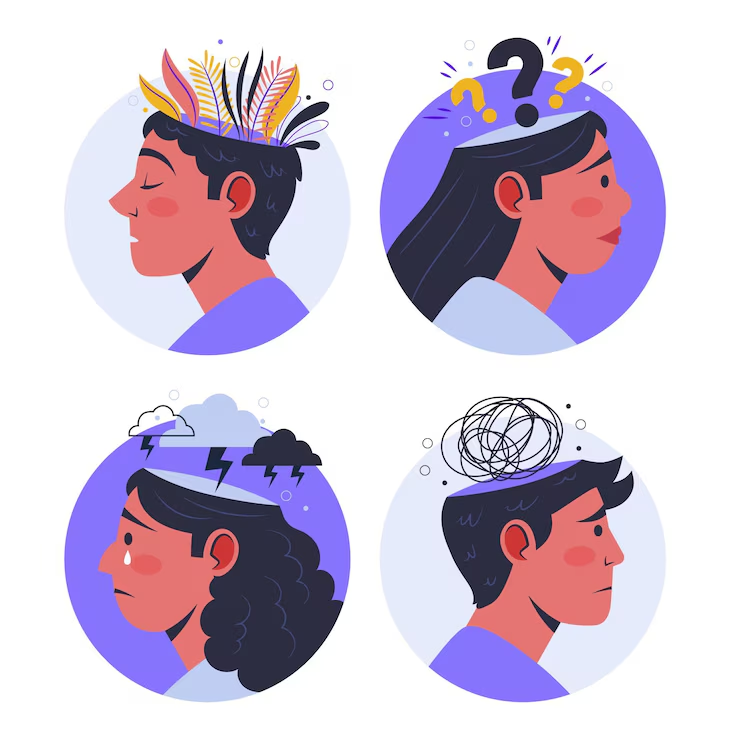Introduction: The Importance of Mental Health
Mental health is an essential aspect of our well-being, impacting how we feel, think, and behave daily. It plays a crucial role in determining how we handle stress, build relationships, and make decisions. While society has become more aware of mental health in recent years, many still struggle to prioritize their emotional well-being. This blog focuses on the importance and, recognizing early warning signs, and offers effective strategies to enhance emotional resilience for long-term stability and happiness.
The Importance of Mental Health
1. Why Mental Health Matters,
Our mental health affects every aspect of our lives, including our physical health, productivity, and relationships. Here’s why taking care of your mental should be a top priority:
- Impact on Physical Health: Studies show that poor mental health can weaken the immune system, making the body more susceptible to illness. Conditions like anxiety and depression are associated with sleep problems, fatigue, and digestive issues, highlighting the mind-body connection.
- Workplace Productivity: Mental health challenges can interfere with your ability to focus and perform well at work. In fact, mental health issues are among the leading causes of workplace absenteeism. Prioritizing mental well-being can improve your ability to handle pressure, maintain focus, and be more productive in all aspects of life.
- Healthy Relationships: Emotional well-being is the foundation of strong, healthy relationships. Mental health conditions can create barriers to communication, lead to isolation, and strain relationships. On the other hand, good mental health fosters empathy, patience, and open communication.
- Coping with Stress: Life is filled with challenges, from personal loss to financial struggles. Those with strong mental health are better equipped to cope with stress, develop solutions, and bounce back from adversity.
2. Common Mental Health Conditions
Mental health disorders are widespread, and it’s important to be aware of the most common conditions to seek help early. These include:
- Depression: Characterized by prolonged feelings of sadness, hopelessness, and a lack of interest in daily activities. Depression can interfere with sleep, appetite, and social relationships, significantly reducing one’s quality of life.
- Anxiety: Anxiety disorders include excessive worry or fear that interferes with daily activities. Social anxiety, panic disorder, and generalized anxiety disorder are some examples of anxiety-related conditions.
- Bipolar Disorder: This condition causes extreme mood swings between manic (high energy and euphoria) and depressive episodes. Managing bipolar disorder often requires a combination of therapy and medication.
- Post-Traumatic Stress Disorder (PTSD): PTSD develops after experiencing or witnessing traumatic events. Symptoms include flashbacks, nightmares, and severe anxiety that can last for months or even years after the event.
- Eating Disorders: Conditions such as anorexia nervosa, bulimia, and binge-eating disorder are characterized by unhealthy relationships with food, which are often tied to mental health issues like low self-esteem or body dysmorphia.
3. Signs That Your Mental Health Needs Attention
Recognizing the signs of mental health struggles early on is critical to getting the right help. Here are some common indicators:
- Persistent feelings of sadness or hopelessness
- Intense mood swings
- Withdrawal from friends and family
- Changes in eating or sleeping patterns
- Feeling overwhelmed or constantly stressed
- Difficulty concentrating or making decisions
- Using alcohol or drugs to cope
- Thoughts of self-harm or suicide
If any of these symptoms persist for more than a few weeks, it’s essential to reach out for professional help.
4. Effective Strategies to Strengthen Mental Health
Improving it doesn’t happen overnight, but with the right strategies, you can build emotional resilience and lead a more fulfilling life.
- Practice Mindfulness and Meditation: Mindfulness involves staying present in the moment and accepting your thoughts and feelings without judgment. Practicing mindfulness through meditation, yoga, or breathing exercises can reduce stress and improve emotional regulation.
- Maintain a Strong Support System: Having a trusted support system of family, friends, or a therapist is crucial for mental health. Whether it’s talking through problems or simply spending quality time together, strong relationships provide emotional comfort and reduce feelings of isolation.
- Exercise Regularly: Physical activity releases endorphins, which improve mood and reduce symptoms of anxiety and depression. Aim for at least 30 minutes of exercise most days of the week.
- Establish Healthy Boundaries: Knowing when to say “no” and protecting your time and energy from unnecessary stressors is key to mental well-being. Healthy boundaries allow you to prioritize self-care without guilt.
- Get Plenty of Sleep: Sleep is essential for brain function and emotional stability. Lack of sleep can exacerbate mental health issues, leading to increased stress, irritability, and poor decision-making. Aim for 7-9 hours of quality sleep each night.
- Stay Connected to Your Passions: Pursuing hobbies and activities that bring joy and fulfillment can help you manage stress and boost self-esteem. Creative outlets such as art, writing, or gardening provide an excellent way to relax and express emotions.
- Seek Professional Help When Needed: Therapy or counseling is not just for those with severe mental health conditions. Speaking to a professional about stress, anxiety, or emotional challenges can help you gain clarity and develop coping strategies.
5. How to Break the Stigma Around
Despite growing awareness, there is still stigma associated , preventing many from seeking the help they need. Here’s how you can contribute to breaking the stigma:
- Open Conversations: Speak openly about mental health and encourage others to do the same. The more we talk about it, the more we normalize it.
- Educate Yourself and Others: Understanding the nuances of mental health conditions can help dispel myths and reduce fear. Sharing this knowledge with others creates a more supportive environment for those struggling .
- Encourage Help-Seeking Behavior: Let others know that seeking help is a sign of strength, not weakness. Support friends and family in their journey and remind them that professional help is available.
Conclusion
Mental health is an integral part of a healthy and balanced life. By recognizing the importance , understanding common disorders, and implementing effective strategies, you can improve your emotional resilience and overall well-being. Remember that seeking help is a crucial part of maintaining , and together, we can break the stigma and create a more supportive society for everyone.
The Importance of Mental Health


2 thoughts on “The Importance of Mental Health: Strategies to Strengthen Emotional Resilience”